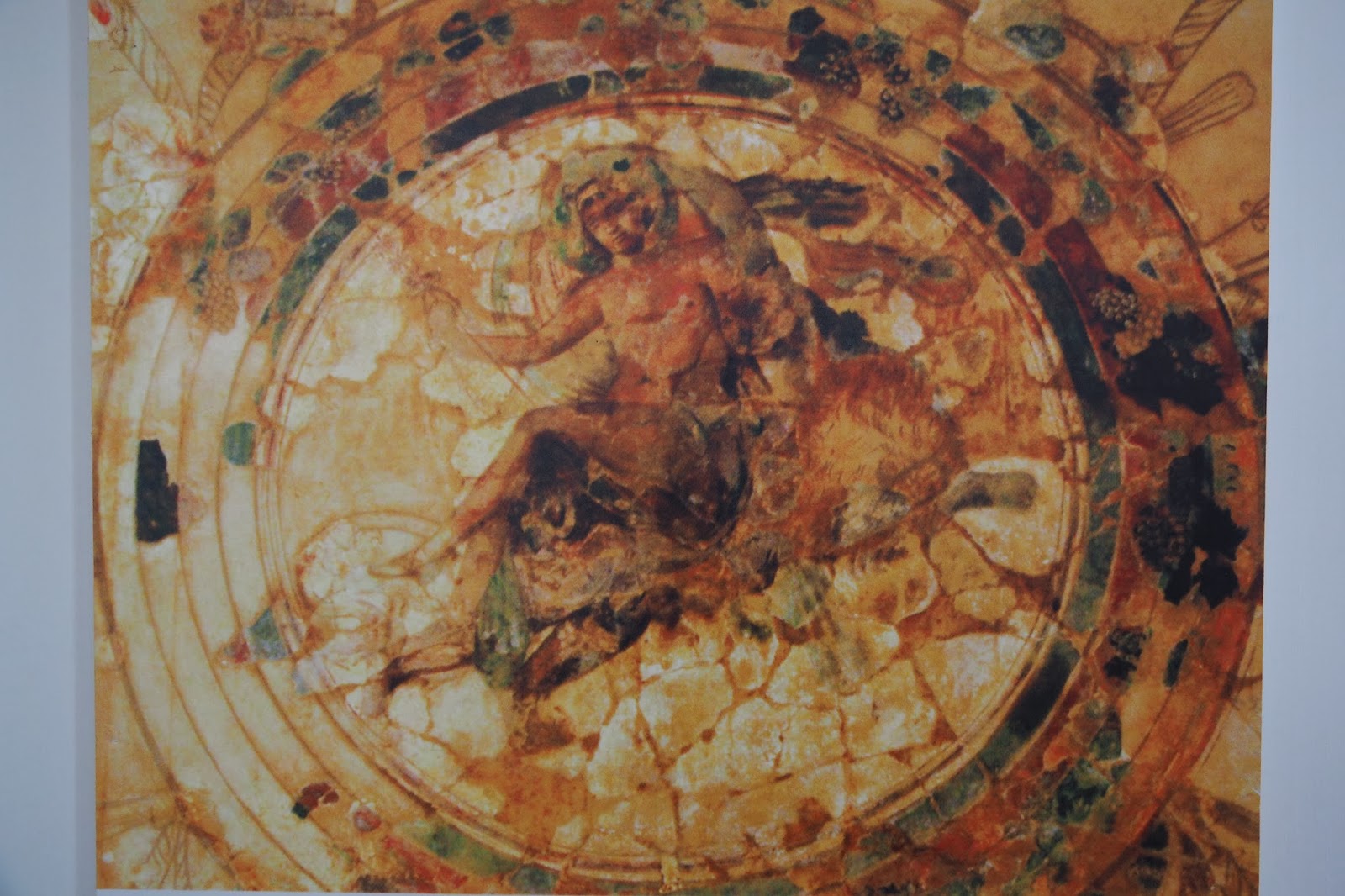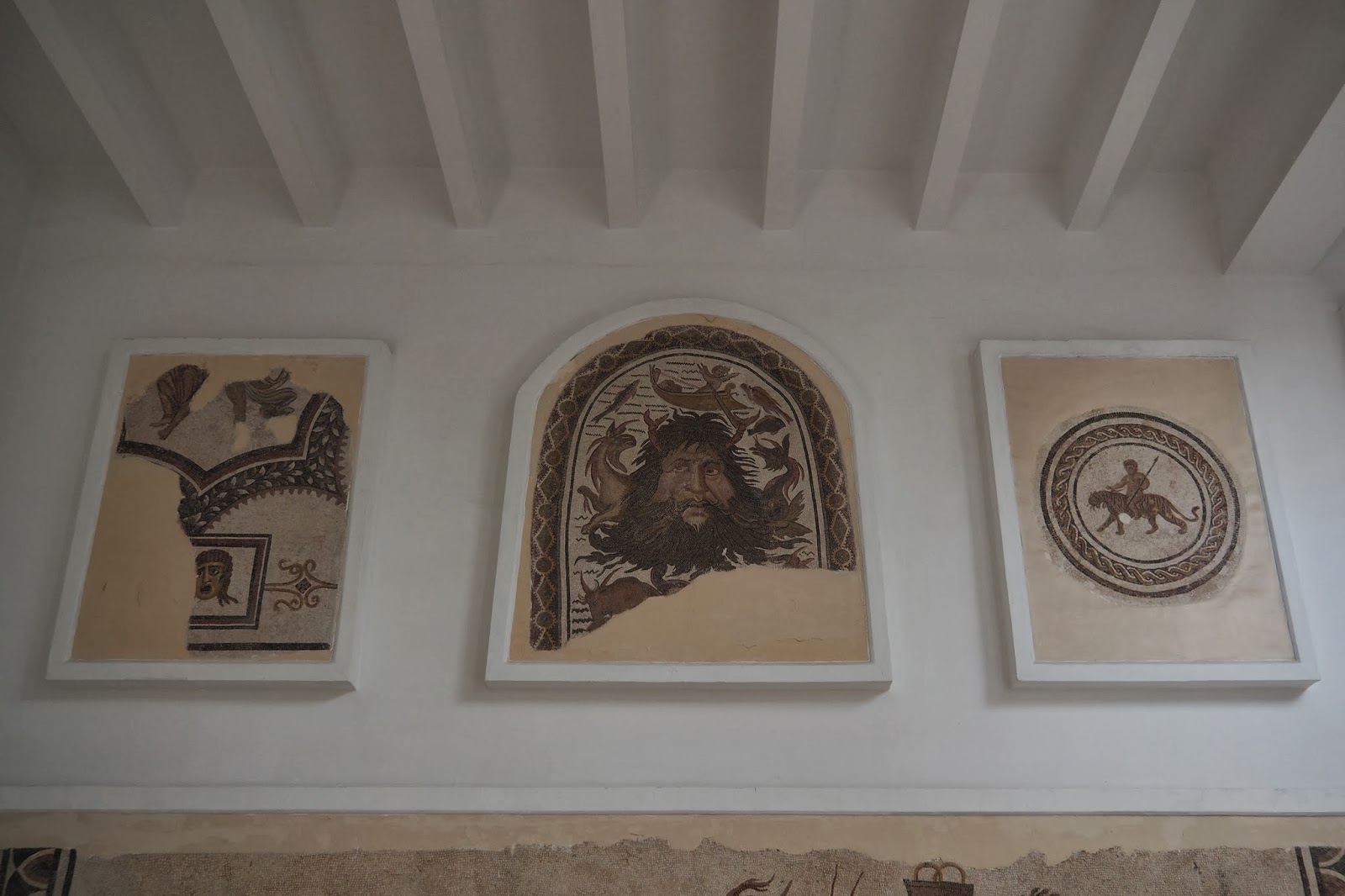The chief attraction of the Bardo Museum is not its collection of Carthaginian and Roman sculpture but its reconstitution of floor or wall tile mosaics from different ancient Carthaginian and Roman monuments and ancient archaeological sites.
An early 3rd century BCE mosaic found at Hadrumetum ( Sousse) in the House of Virgil, showing the famous Roman poet Virgil surrounded by two muses: Calliopse the muse for eloquence and epic poetry and Polymnia, the muse of pantomime.
A 4th century BCE mosaic found at Thuburbo Maius showing the haloed goddess Venus on a chariot driven by little Loves all armed with little arrows
A 3rd century BCE mosaic showing Satyrs ( a tribe of half-goat. half man following Pan with goat-like (caprine) features, including a goat-tail, goat-like ears, and sometimes a goat-like phallus roaming the forests and often associated with pipe playing.) led by their chief Silenus, a minor deity associated (like Hermes and Priapus) with fertility) and the heads of Bacchantes, with Hercules (Heraclitus) and his beloved Omphale surrounded by little winged spirits and with the god Dionysius standing behind him
An early 4th century mosaic found at the House of Venus Char in Thuburbo Maius showing a hunting scene.
A huge 4th Century BCE wall mosaic found at Thuburbo Maius showing a seascape with boats, fishes etc.
Another early 4th century mosaic found at Carthage showing some sea-side
pleasure houses,with dolphins, sea monsters, loves and Nereids ( sea
nymphs, the 50 daughters of Nereus and Doris, sisters to Nerites, living in a silvery cave under the sea but distinct from the mermaid-like Sirens, usually surrounding the sea god Poseidon and who may help sailors during perilous storms. The most notable of them are Thetis, wife of Peleus and mother of Achilles; Amphitrite, wife of Poseidon; and Galatea, lover of the Cyclops Polyphemus.
Two little Loves holding a fish net full of fishes found at a Roman house at El Jem, 3rd century BCE.
A fisherman found at the same place
Part of a mosaic showing various fishes, sea snakes etc.
More fishes, eel etc
part of a late 3rd century BCE mosaic found at Masada showing the sea god Neptune on a chariot pulled by hippocampuses surrounded by fishes and the head of the god the four winds
the upper part of the same mosaic
A sea full of fishes, crustaceans, molluscs
Villas of the period
Even the floor of the museum, a former palace is paved with mosaic tiles
The beautiful horse-shoe arches and overhanging arches of the room
The mosaic on the floor of the room
A mid 3rd century BCE mosaic found at Althiburos (El Ma'daina) showing a lion, with 4 stalks of millet, a palm and a pitcher, the symbol of Leontil sodality
The base of an acanthus (thorn) with the insignia of the Leontil Sodality (the universality of the Catholic church) : the millet stem.
The part of the roof of the museum
a beautiful dome on the roof of the museum
Another such dome with intricate mosaic patterns
The view from the bottom
The mosaic below the dome
A fish
a peacock
Two pheasant: they form part of what the guest of the house may expect to get from their meals there


Partridges
A typical farming scene
A peacock tail decorates the arch
A beautiful fresco ( a wall painting technique by applying paint to the last coat of plaster before it is completely dry so that the paint will penetrate into the plaster perfected between the 3rd and 1st century CE)
 |
Another set of mosaics showing the hunting of various types of animals
All kinds of beasts: mainly cows and bears
Various animals involved in the hunt
An archer?
A mosaic found at Curubis (Korba) showing two bears fighting, 4th C CE
A mosaic found at Carthage showing two lions facing each other under a tree, 4th C CE
Finial, a magpie, a duck, a guinea fowl or warder in a floral decoration found at Thuburdo Maius 3rd Century CE
Another god?
The four seasons
The triumph of Dionysius and the busts of two seasons, Spring and Winter found at Achollas (the Bath of Traianus ) Henchir Boutria 120-130 CE
The harvest
Hunting
Dolphin and marine centaur found at Baths of Trianus 120-130 CE
Poseidon/Neptune?
A ship with its various kinds of goods?
The 9 Muses with their characteristics found at El Jem 3rd century CE
A goat between two shrubs found at El Jem 3rd century CE
A carafe inside a reed basket and a glass cup found at El Jem 3rd century CE
Black and white grapes found at El Jem 3rd century CE
A boar and a sow found at El Jem 3rd century CE
A doe between two shrubs found at El Jem 3rd century CE
The glass roof over the stairs
Another ceiling decoration
Another golden roof
Some birds and animals
A mosaic found at a both at Dougga late 3rd century CE showing three Cyclops: Brontes, Stereope and Pyracmon forging lightning for Jupiter
The Triumph of Neptune and the 4 Seasons found at private bath of Caput Vida (La Chebba) end of the reign of Antonius Pius 138-161 CE
A mosaic found at Sousse mid-3rd century BCE showing how food is unloaded and weighed
A mosaic found at Thysdrus (El Jem) mid-2nd century CE showing Xenia, gifts of hospitality and various animals





























































沒有留言:
張貼留言